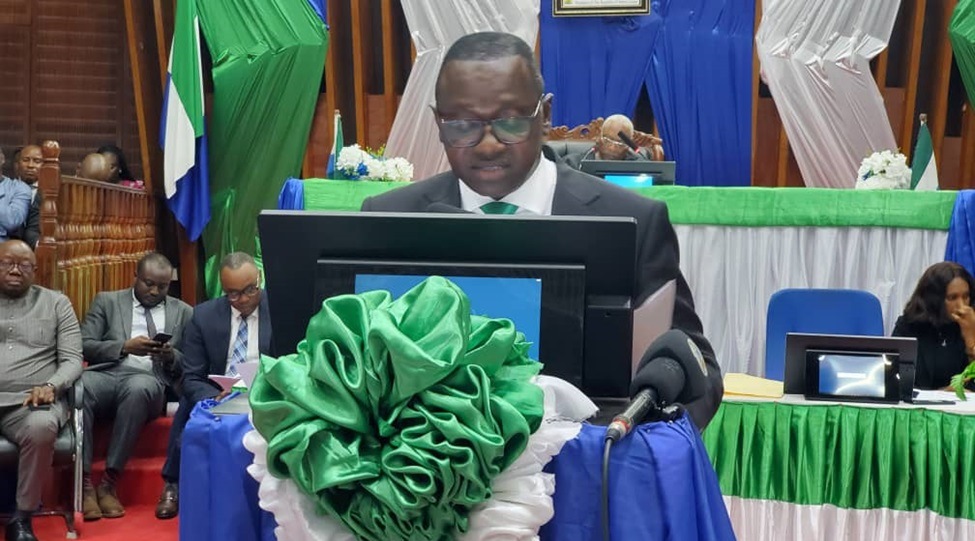By Alusine Fullah
The word budget comes from the Old French bougette which means–“little bag”. That is not enough, in his book: “Government Spending and Monetary Policy,” John Maynard Kaynes (The Giant Economist) he wrote about the need for annual fiscal budget for any government/ company to succeed in financial management. He wrote: “An annual budget is a plan for a government or company’s projected expenditures over the course of a year. Annual budgets act as benchmarks against which government or company can measure progress and as tools to help better manage money. The Budget is the Government’s plan for its revenues and spending for a fiscal year by providing an estimate of the amount of revenue that the Government expects and describes how these revenues will be distributed to the various programs and services.” Put Simple, a government budget is a projection of the government’s revenues and expenditure for a particular period of time often referred to as a financial or fiscal year, which may or may not correspond with the calendar year. Government revenues mostly include taxes (e.g. inheritance tax, income tax, corporation tax, import taxes) while expenditures consist of government spending (e.g. healthcare, education, defense, infrastructure, social benefits). In line with the foregoing, for effective financial planning, the Minister of Finance, (2022) Dennis K. Vandi presented Government Budget and Statement of Economic and Financial Policies for the financial year 2023. The presentation was done on Friday, 11th November, 2022. The theme of that financial year budget was: “Addressing the needs of the vulnerable in the context of the Multiple Crises.”
In line with the foregoing, for effective financial planning, the Minister of Finance, (2022) Dennis K. Vandi presented Government Budget and Statement of Economic and Financial Policies for the financial year 2023. The presentation was done on Friday, 11th November, 2022. The theme of that financial year budget was: “Addressing the needs of the vulnerable in the context of the Multiple Crises.”
Since 2020, Sierra Leone, like the rest of the world, has been experiencing multiple crises brought on by the COVID19 pandemic, the ongoing crisis in Ukraine and the intensifying risks of climate change. While the frequency and duration of these crises seem unpredictable, they have disrupted supply chains, created uncertainty, and exacerbated shortages of key essential commodities, causing a sharp rise in the prices of food, fuel and fertilizer to unprecedented levels.
In order to mitigate the lingering financial crises, in his presentation of financial year 2023, Dennis K. Vandi stated: “Mr. Speaker, Honorable Members, despite the limited fiscal space engendered by the ongoing crises, Government will continue to implement programmes and policies to mitigate the impact on the population, especially the vulnerable groups. Therefore, the 2023 Budget seeks to provide support to:
- intensify local food production and facilitate food importation to address food insecurity, especially for the most vulnerable groups; ii. Sustain critical investments in education and health to improve human capital; iii. Expand social safety nets to enable vulnerable people to cope with the challenging economic situation; IV. Pursue adaptation and mitigation measures in response to climate change risks; v. promote private sector development for job creation; VI. Contain inflation and stabilize the exchange rate to lower the cost of living; vii. Strengthen public finances and maintain sustainable debt levels; and viii. Improve governance and accountability.
It seems that the main budget for 2023 is not enough to adequately address the financial crises in Sierra Leone. In nexus to that, on the 31st of July 2023, parliament members unanimously approved the FY2023 Supplementary Budget entitled the Supplementary Appropriation Act 2023, an Act to authorize expenditure from the Consolidated Revenue Fund for the services of Sierra Leone. As the names implies, ‘supplementary budget’, it simply stands to add/ give more support to the main budget.
Presenting the budget in the Well of Parliament, the Minister of Finance, Sheku Fantamadi Bangura, highlighted the reasons for the revision of the original FY2023 budget ranging from changes in macroeconomic assumptions in the initial revenue and expenditure projections to some activities implemented by Ministries, Departments and Agencies (MDAs) not sufficiently budgeted for due mainly to the limited fiscal space, new expenditure pressures driven by policy pronouncements as well as the continued global rise in prices of goods and services, and the depreciation of the Leone. He said:
Mr. Speaker, Honourable Members, after six months of implementing
the Budget, we saw the need to revise the 2023 fiscal framework for the following reasons:
First, the macroeconomic assumptions on which the original revenue and
expenditure projections were based no longer hold. The original 2023 budget
was based on the macroeconomic framework agreed with the IMF during the
fifth review of our performance under the ongoing programme with the IMF
Extended Credit Facility in November 2022. The macroeconomic framework was revised during the combined sixth and seventh reviews in May 2023. This revised macro-framework formed the basis of the revenue and expenditure projections in this Supplementary Budget;
Second, some activities implemented by Ministries, Departments and
Agencies (MDAs) were not sufficiently budgeted due to the limited
fiscal space. At the same time, new expenditure pressures have emerged, driven
in some cases by policy pronouncements as well as the continued global rise in
prices of goods and services, and the depreciation of the Leone. There is therefore the need to enhance budget allocations to some MDAs to realistic but affordable levels for the delivery of services;
Third, to align the Budget to the new priorities of Government articulated
in the Government Manifesto-the BIG FIVE, which include boosting food security
(FEED SALONE), consolidating the gains in human capital development,
supporting youth employment initiatives, improving infrastructure, and revamping the public service with the overall objective of boosting resilience and promoting Sustainable economic growth.
Fourth, to accommodate the needs of the new architecture of Government
following the establishment of new MDAs to improve governance in general and the efficiency of public administration in particular; and
Fifth, to begin the process of consolidating public finances to stabilize the
economy.
He went further that the Supplementary Budget aims to reduce the budget
deficit from 9.6 percent of GDP in 2022 to 5.4 percent of GDP in 2023. This, in
turn will reduce the borrowing requirement of Government especially from the
banking system, thereby complementing the efforts of the Bank of Sierra Leone
(BSL) in containing inflation, slowing down the depreciation of the Leone and
reducing the pace of debt accumulation.
He further mentioned that this supplementary budget would align new priorities of the Government articulated in the Government Manifesto-the BIG FIVE, which includes boosting food security (FEED SALONE), consolidating the gains in human capital development, supporting youth employment initiatives, improving infrastructure, and revamping the public service with the overall objective of boosting resilience and promoting sustainable economic growth.
He added that the aim is to reduce the budget deficit from 9.6% of GDP in 2022 to 5.4% in 2023. This, he said, will, in turn, reduce the borrowing requirement of the Government, especially from the banking system, thereby complementing the effort of the Bank of Sierra Leone in containing inflation, slowing down the depreciation of the Leones and reducing the pace of debt accumulation.
Minister Bangura Presented macroeconomic and budgetary performance during the first half of the year, citing a projected moderate growth of 2.7 per cent in 2023.
On that day, he also informed members of parliament that uncertainty in the global economy, higher food and fuel prices, exchange rate depreciation, weak purchasing power and tight fiscal stance will weigh on growth in 2023. Sheku Ahmed Fantamadi Bangura highlighted several revenue generation measures to increase domestic revenue generation.
He explained that domestic revenue collected during the first half of 2023 amounted to NLe4.7 billion, exceeding the original target by NLe367 million. He informed MPs that to achieve the projected increase in domestic revenues; the Government is implementing the Finance Act, 2023, the Medium-term Revenue Strategy (MTRS), which Cabinet approved in April 2023. Noting that these tax policy measures will yield additional tax revenues in 2023 and 2024, estimated at 1.8 per cent of GDP.
The Minister also spoke about Social Safety Net and the MUNAFA Fund that will adequately address domestic financial shocks. He highlighted:
Mr. Speaker, Honourable Members, I am pleased to inform this Noble
House that the Productive Social Safety Net and Youth Employment Project funded by the World Bank has also commenced operations. Under this project:
Twenty-one million dollars (US$21million) will be made available to cover
Cash Transfers and Economic Inclusion Support to 15,000 extreme-poor
households;
Six million dollars (US$6 million) will be provided to promote Productive
Labor Intensive Public Works and Life Skills Support for 13,000 youths
in rural and urban communities;
The Project will further deliver grants and training on life skills in
entrepreneurship and information technology at the estimated cost of
US$6 million to 8,000 youths in urban areas, including women and
persons with disabilities as part of the Employment and Entrepreneurship
Support for Youth.
Mr. Speaker, Honourable Members, following the establishment of the
MUNAFA Fund (a revolving micro credit scheme) and the provision of resources for on-lending to MSMEs, I am pleased to report that the Fund has reached 10,889 beneficiaries, 72 percent, of which, are women. Government remains committed to providing additional resources to expand the programme and reinforce its role in employment, wealth creation and poverty alleviation.
In the area of fuel subsidy, he stated that the Government forgone in the form of direct and indirect subsidies amounted to NLe783 million (US$35 million) during the first half of the year, noting that government will continue to implement measures to mitigate the impact of the multiple crises on the people despite the limited fiscal space amid competing priorities, such as energy subsidies, Provision of Agricultural Inputs to Farmers, scaling up Social Safety Nets, Free Health Care, Free Quality Education, School Feeding and more.
During the debate, Members of Parliament applauded the Minister and Team and the Ministry of Finance for their effort to maintain the economy during this challenging period. Also, they proffered suggestions on improving revenue and maintaining rational expenditure for the people of Sierra Leone.
However, it seems that what the entire minister said is relatively based on theory. What is actually in the ground is quite different to what is said by the Minister of Finance. Practically, hardship continues to bite deep!! The words of the minister are really not reflecting on the lives of Sierra Leoneans: Twenty-one million dollars (US$21million) will be made available to cover
Cash Transfers and Economic Inclusion Support to 15,000 extreme-poor
households;
Six million dollars (US$6 million) will be provided to promote Productive
Labour Intensive Public Works and Life Skills Support for 13,000 youths
in rural and urban communities.









